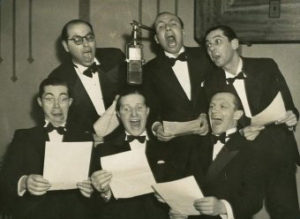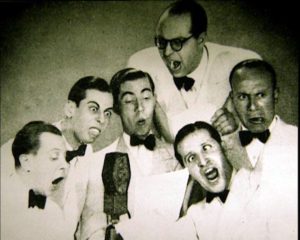New book traces contribution of migrant musicians
A newly translated book reveals the significant impact emigree musicians, who came to Australia fleeing the Nazis in the 1930s, had on the cultural life of Australia.
The Vanished Musicians by Albrecht Dumling, recently been published in English, traces the difficult journey of the orchestral performers, virtuoso soloists, singers, conductors and composers who sought refuge on a distant continent.
About 9,000 Jewish refugees from Nazi Germany settled in Australia between 1933 and 1945, a small fraction of the hundreds of thousands who fled.

Weintraub’s Syncopators
Although initially greeted with a mixed reception as ‘enemy aliens’, some of these refugees remained and made a significant impact on multicultural Australia.
Many were famous artists who toured Australia and stayed, most notably the piano virtuoso Jascha Spivakovsky and the members of the Weintraub’s Syncopators, one of the most successful jazz bands of the Weimar Republic.
Based on extensive primary sources – including correspondence, travel documents and interviews with the refugees themselves or their descendants – the author depicts in vivid detail the lives of nearly a hundred displaced musicians.
Jascha Spivakovsky was a Jewish piano virtuoso who was targeted by the Nazis over his reputation for interpreting Brahms and other German composers.
When they began disrupting his concerts, he hurriedly arranged an Australasian tour of 70 concerts for himself and his trio and they boarded ship a few days before the Nazi seizure of power in 1933.
Their tour was a phenomenal success and they were proclaimed “the finest trio of instrumentalists in the world”.
Sought by the leading Australian music institutions, the trio became faculty at the University of Melbourne and thereby avoided having to return to Germany at the end of their tour.
However, for the next five years they were at constant threat of the notorious Dictation Test used by Australian immigration officers to arbitrarily deport Jewish people and others they deemed racially undesirable.

Waintraub’s Syncopaters
After the war, Spivakovsky returned to his musical career with great seriousness of purpose and he toured around the world for the next 14 years.
By the time he retired from touring for health reasons in 1960, Spivakovsky had performed with virtually every great conductor of his era.
Waintraub’s Syncopaters were a well-honed cabaret act with a repertoire of hot jazz and novelty comedy songs. Between them, the seven members played more than 30 instruments.
In 1934, the Weintraubs played all over Europe and in Manchuria, Shanghai, and Japan where in 1936 they secured a recording contract and made a number of records.
By that time it was clear to the group that they could not go back to Berlin.
By 1938, they were playing in Sydney, resident at the city’s leading nightclub, Prince’s.
One of the most frequent visitors was MP Robert Menzies, later Australia’s prime minister, who helped get exit visas for some of group’s families in Berlin.
The visas arrived in Berlin on the day after Kristallnacht, November 1938.
Once war was declared in September 1939, Australia, in common with its Commonwealth allies, interned many German Jews in the mistaken belief that they were enemy aliens.
By 1942, the band had effectively broken up. The rest of the band who had been interned were released, and those who could joined the Australian armed forces.
By the end of the war, some members of the Syncopators, by now all resident in Australia, were playing as individuals, but the band never played as a whole again.
Laurie Nowell
AMES Australia Senior Journalist












